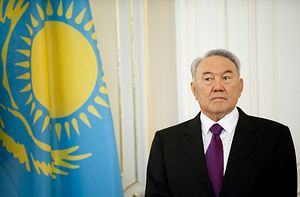Central Asia’s leaders are excited by the progress in negotiations between Iran and the P5+1. Hemmed in by sanctions-hit Russia to the north, an energy-hungry but distant China to the east, war-torn Afghanistan to the south, the region looks forward to the economic opportunities presented by an opening of Iran.
The framework agreement announced on April 2 included the promise of sanctions relief, which would make Iran a much more attractive partner for the states of Central Asia which already have relations of varying degrees with Iran. Iran, for its part, recognized the region as vital. On Monday, Iranian Foreign Minister Mohammad Javad Zarif commented that Iran considers “no ceiling for the expansion of relations with regional countries whether in the Caucasus or in Central Asia,” in a joint press conference with his Kazakh counterpart, Yerlan Idrisov.
Kazakhstan’s President Nursultan Nazarbayev, in his own press statement after meeting with Zarif, noted that “the two countries have great potential for cooperation” and that “much work is conducted as part of the revival of the Silk Road.”
He went on to mention the Kazakhstan-Turkmenistan-Iran Railway which opened late last year and the ongoing cooperation among the Caspian littoral states, which are still working to determine the status and borders of the energy-rich sea.
In a pair of press releases congratulating Iran and the P5+1 on the framework deal, Kazakhstan and Uzbekistan trumpet their non-nuclear credentials and promote their roles in helping the negotiations along.
Kazakhstan revels in its history, having “voluntarily renounced nuclear weapons.” The country inherited 1,410 nuclear warheads and a testing facility at Semipalatinsk when the Soviet Union dissolved in 1991. By April 1995, Kazakhstan was nuclear-weapons free after repatriating the warheads back to Russia. The nuclear testing infrastructure at Semipalatinsk was destroyed by the summer of 2000. The country has since been a strong supporter of non-proliferation efforts, hosting two rounds of talks between Iran and the P5+1 in 2013.
In its statement, Uzbekistan calls attention to the treaty on a nuclear-weapon-free zone in Central Asia (CANWFZ) which it ratified first in the region on May 10, 2007. The treaty forswears nuclear weapons indefinitely and went into effect, signed and ratified by all five Central Asian states, in 2009.
Not mentioned in either press statement, but widely accepted, is Central Asia’s energy interest in the normalization of Iran’s relations with the world. Iran presents the shortest route for exporting gas to Europe. The viability of this route excites both Central Asians and Europeans, who see it as an attractive alternative to exporting, and obtaining, gas via Russian pipelines.
At a roundtable organized by Radio Free Europe/Radio Liberty’s Turkmen Service, Alex Vatanka of the Middle East Institute summed this excitement perfectly:
The Central Asians have wanted “to break that geopolitical grip [of China and Russia],” but with the southern route closed off there were no other options. Now, Vatanka said, “You see from Astana to Ashgabat an interest in reconsidering what Iran can do for them geopolitically to lessen their reliance on countries like Russia and China.”
Central Asia is excited by progress in the P5+1’s negotiations with Iran because it presents a valuable economic opportunity that has long waited in the wings: a relief from the pressures of Russia and China. The progress also validates, in a way, the region’s decision to remain non-nuclear, providing states with dubious human rights records something the international community can commend them for.

































